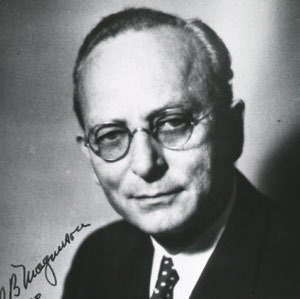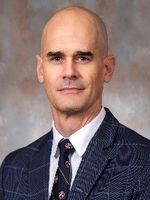The Paul B. Magnuson Professorship of Bone & Joint Surgery II
 Established in 1974 through the bequest of Laura T. Magnuson, the widow of Paul B. Magnuson, MD, the Professorship honors the memory of the distinguished alumnus of the Perelman School of Medicine Class of 1908, a leading bone and joint surgeon.
Established in 1974 through the bequest of Laura T. Magnuson, the widow of Paul B. Magnuson, MD, the Professorship honors the memory of the distinguished alumnus of the Perelman School of Medicine Class of 1908, a leading bone and joint surgeon.
After graduating from Penn, Dr. Magnuson moved to Chicago, where he gained worldwide acclaim as an orthopaedic surgeon. He was Chief Surgeon for the Chicago Junction Railroad, the first Medical Director of the Illinois Industrial Commission, and the Founder of the Rehabilitation Institute of Chicago. Dr. Magnuson was Professor Emeritus of Surgery and Chairman of the Department of Joint and Bone Surgery at the Feinberg Medical School at Northwestern University. In 1948, he was named Chief Medical Officer of the Veterans Administration and, in 1952, was appointed Chairman of President Harry S. Truman’s Commission on the Health Needs of the Nation. Dr. Magnuson’s 1960 autobiography, Ring the Night Bell—An American Surgeon’s Story, recounts his experiences at the University of Pennsylvania.
 Current Chairholder
Current Chairholder
Benjamin Potter, MD, FACS
Benjamin “Kyle” Potter, MD, FACS earned his undergraduate degree from the United States Military Academy at West Point and his MD from the University of Chicago Pritzker School of Medicine. He completed his residency in Orthopaedic Surgery at Walter Reed National Military Medical Center and received fellowship training in Orthopaedic Oncology at the University of Miami Miller School of Medicine. Prior to joining Penn Medicine, Dr. Potter held the Norman M. Rich Professor and Chair of the Department of Surgery at the Uniformed Services University – Walter Reed National Military Medical Center. He was also a musculoskeletal oncologist in the Murtha Cancer Center at Walter Reed, as well as a consultant for the National Cancer Institute.
Dr. Potter retired as a Colonel from the U.S. Army in 2023 following over 22 years of active-duty service during which he made impactful contributions to both military and civilian medicine. His military service included surgical leadership posts during deployments to Afghanistan and Kuwait, and he has operated on more than 1,000 injured service personnel returning from duties overseas, including more post-9/11 U.S. war casualties with limb loss than any other surgeon. As a clinical researcher and innovator, Dr. Potter was a founding Deputy Director of both the Surgical Critical Care Initiative (SC2i) and the Department of Defense Limb Optimization and Osseointegration Program (LOOP) at USU-Walter Reed, as well as the site Principal Investigator for the Major Extremity Trauma Research Consortium (METRC). These clinical and research efforts have led to the development of numerous cutting-edge techniques and programs to improve care and quality of life for injured service members, focused on trauma-related amputation techniques to improve mobility and decrease pain, and predictive modeling of musculoskeletal trauma and oncologic outcomes—which have had a ripple effect to help other patients worldwide.

